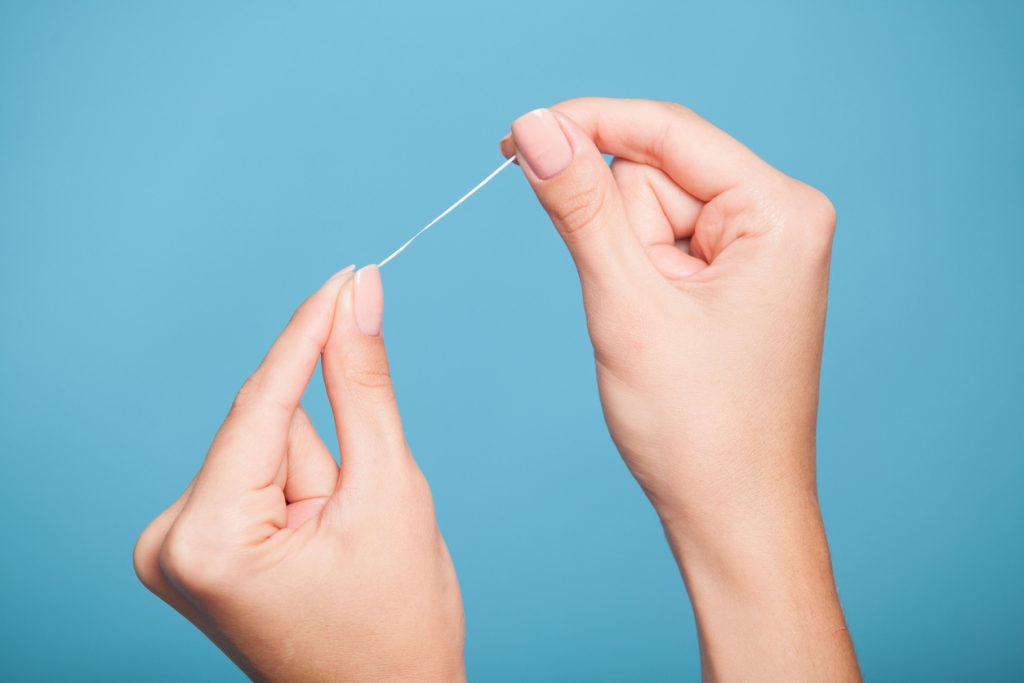“Can I just rinse with mouthwash instead of flossing?”
This is a question we hear all the time.
There has been scientific debate around this issue, with research supporting both sides of the argument (for and against.)
Mouthwash v. Floss in Court
In 2004, a Johnson & Johnson company which makes dental floss brought a lawsuit against Pfizer, the maker of Listerine, arguing that false claims in Listerine’s advertising posed a threat to sales of dental floss. This was important because Listerine’s ads were claiming that Listerine was just as effective as dental floss for oral care.
The Ruling
In January 2005, U.S. District Judge Denny Chin in New York ruled:
An advertising campaign that says the mouthwash Listerine is as effective as floss at fighting tooth and gum decay is false and misleading and poses a public health risk.
“The benefits of flossing are real — they are not a ‘myth,’” said the judge afterwards.
The Evidence
In making his decision, the judge cited “substantial evidence” from his research showing that “flossing is important in reducing tooth decay and gum disease and that it cannot be replaced by rinsing with mouthwash.”
Since the Listerine ads had argued that their product was “clinically proven to be as effective as floss,” the judge made another note. He added that Pfizer had based its claims on articles written by dental professionals who also wrote that dentists should continue to recommend daily flossing. The authors also cautioned that they were not suggesting that mouthwash be used instead of floss.
Why Floss?
There are a few reasons why flossing is irreplaceable.
One convincing argument is that “string flossing involves mechanical scraping, which (mouthwash) does not.” So, while Listerine and comparable products are capable of softening plaque as well as killing microorganisms, only flossing can remove the remaining debris.
As far as microorganisms go, mouthwash is only able to kill the bacteria living on the surface of the plaque. It won’t have any effect whatsoever on the bacteria and microorganisms inside the plaque.
Scrubbing with string floss, on the other hand, “completely decomposes the bacteria’s microcosm.” That means that these microcosms of bacteria – which are the cause of most damage to teeth and oral health – must be rebuilt from scratch to do any more damage. That is a good thing for your mouth!
Why do People Rinse in Place of Flossing?
The #1 reason people rinse with mouthwash instead of flossing regularly is because it’s easier.
Flossing is often viewed as laborious and time-consuming. Add to that the fact that only about 5% of people who floss do it right, and you can see why so many people try to use mouthwash instead.
For example, as your periodontist in Glendora, Dr. Desai can show you that the correct flossing method. The trick is to hook the string around your tooth in a “C” shape. Why? It’s to make sure you remove the plaque from all the hard-to-get spots. In contrast, is there anything you don’t know about rinsing with mouthwash? Probably not! Rinsing with mouthwash is simple and straightforward – it’s pretty hard to do wrong.
Should I Still Use Mouthwash After I Floss?
Yes. Mouthwash is an effective tool in the promotion of healthy teeth and gums. Some of the benefits of mouthwash are:
It Freshens Breath
Mouthwash temporarily reduces or eliminates bad breath by killing the bacteria that causes it. It comes in many assorted flavors (and therefore scents!)
Prevents Plaque Build-up
Mouthwash prevents plaque build-up on your gums, in-between teeth, and on the surface of your teeth as well. While mouthwash prevents new plaque from forming and can also soften existing plaque, it cannot remove plaque that is already there. Only brushing and flossing can do that, so make sure you do those daily.
Removes Particles
Most people think of rinsing their mouths with mouthwash only after brushing and flossing. This is a very good practice, but mouthwash can also be used to rinse out loose particles in your mouth before brushing to make the brushing and flossing more effective.
Stops Cavities from Forming
Use of mouthwash that contains fluoride can help prevent cavities and strengthen your enamel. Not all mouthwash contains fluoride, so be sure to read the label on yours before use or purchase.
Periodontist in Glendora
If you are looking for a periodontist in Glendora, why not try Glendora Family Dentistry? Since 2002, Sachin P. Desai, D.D.S. has practiced excellent dental care in Pediatric Dentistry, Implant Dentistry, and Orthodontics, Oral Surgery, and more! Contact Us today to take a tour of our facility and set your first appointment!



